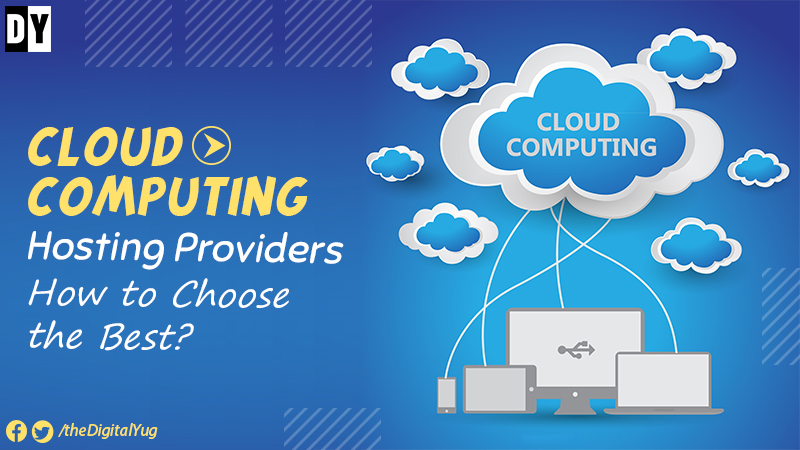Cloud Computing Hosting Providers: How to Choose the Best?
Cloud Computing is getting its way into every business and is diminishing our dependencies on the in-house infrastructure of software and hardware. The introduction of a pay model that allows you to subscribe to services that you simply need and also allows you to upgrade and downgrade anytime is making businesses opt for hosting services even more.
Fun Fact: Approximately 1.3 trillion USD will be directly or indirectly spent restructuring IT and shifting to the cloud by 2022.
Cloud Computing: Introduction
Cloud computing is the supply of computer services such as servers, storage, databases, networking, software, analytics, and intelligence over the Internet (“the cloud”) to provide faster innovation, more flexible resources, and economies of scale. You typically pay solely for the cloud services you use, which allow you to reduce operational expenses, run your infrastructure more efficiently, and scale as your company needs change.
Cloud computing is the on-demand distribution of IT resources via the Internet at a pay-as-you-go model. Rather than purchasing, owning, and maintaining physical data centers and servers, you can use technology services such as processing power, storage, and databases on an as-needed basis.

Cloud Computing: Who Uses it?
Cloud computing is being used by businesses of all sizes, types, and industries for a wide range of applications, including data backup, disaster recovery, email, virtual desktops, software development, and testing, big data analytics, and customer-facing web apps. Financial services firms are using the cloud to power real-time fraud detection and prevention. In addition, video game developers are utilizing the cloud to deliver online games to millions of gamers worldwide.
Example: Healthcare organizations, for example, are utilizing the cloud to produce more individualized treatments for patients.
How to Choose a Hosting Provider: 10 Factors
- Reliability Every business nowadays primarily function across different verticals and wish the services to be up and running all the time to communicate with one another. A robust server that operates 24/7, round the clock is extremely required. Ask your service provider about the server failure rate & other downtime questions to be double sure of reliability.
- Uptime Guarantee The uptime should be above 99% & if it’s anything below this, it’s not acceptable. A well-derived comparison says the more the number of nines in your uptime measure, the higher its uptime. So, a 99.9999% will have a downtime of 31.5 seconds, while a 90% uptime measure will have a downtime of 36.5 days. So, you see how important it’s to make sure the service provider’s uptime guarantee!!!
- Customer Support Once you are choosing a service provider, you better lookout for what support your hosting provider supplies. You certainly can grind to a halt with some technical issue, and once you do, the support should be right there; else, you’ll only be losing your billable hours. Also, check the number of modes for support, if it’s call or chat support or simply chat or another kind. Is it only for the namesake, or is the support available?
Questions to Ask for Customer Support:
- What modes of support are available?
- Is support available 24/7, 365 days?
- Data Security For each business, it’s of utmost importance that your data be protected. While you’re hosting cloud computing, you’ve got to make certain together with your service providers’ data storage security.
Questions to Ask for Data Security:
- What percentage of employees from your organization has access to the confidential data?
- What are the safety algorithms?
- How frequently you update them?
- Costs Your managed service provider should get you a high return on investment. If you’re switching to the cloud, the prime reason was to save lots of cost thereon infrastructure. It should cost less and provides you maximum benefits. If their plans are providing you with a high ROI, sign them on.
- Scalability Business requirements can change at any time. Sometimes, you’ll be overwhelmed with work; other times, there won’t be many workarounds. If the services that are provided by your managed service provider are scalable, then you simply can proportion and down consistent with your requirements. It might be helpful at the end of the day.
- Outsourcing Sometimes, your managed service providers outsource a number of their work to a 3rd party vendor. So, you would like to make certain that if they are doing this, you’re comfortable in sharing your classified data with third-party vendors. If you’re fine together with your vendor outsourcing work, then also you’ll need to ask them about contract arrangement between you, your MSP, and a third party to which work is outsourced to form sure that your business is in safe hands.
- Framework Offering It’s totally hooked into your nature of business. If you’re in an industry where you’re handling patient healthcare records, you would possibly need HIPAA. If HIPAA, PCI, or GDPR compliance is vital, ask the managed service provider if they need the tools to affect it. Also, ask them if employees handling this data are certified. Check if they need SLA to suits your requirements.
- Continuity & Recovery Plan Whenever there’s an unfortunate event like natural calamities it is essential to understand your hosting provider’s recovery plan. This is often a serious question as if their plant to recover themselves from such mishaps isn’t solid enough; you’re only getting to face downtime in your business.
Questions to Ask for Recovery Plan
- What are their recovery plans?
- How are they getting to keep their business and services up and running for you?
- How briskly will they be back on their feet?
- Scope There are tons of service providers who overpromise and under-deliver. Ask them what’s beyond their scope, and since you’re running a business and investing tons in growing your business, you can’t have lower-quality services where all of your time goes in seeking support.
Question to Ask for Understanding Scope
- What can they do and what can’t?
Fun Fact: By 2022, relatively 80% of the workforce is going to be within the cloud.
Cloud Computing Technology: Future Workplace
So, it’s not just you who is lured by the awesome features of cloud computing. Choosing an honest managed service provider might be very helpful in succeeding with cloud computing technology and gain maximum benefits of its potential—research about the various managed service providers. Read client’s review about them. Compare and leverage their services and price with one another and choose the simplest suitable one for your business, then you’re good to travel. Cloud Computing would be very beneficial if its features are appropriately aligned together with your services.

